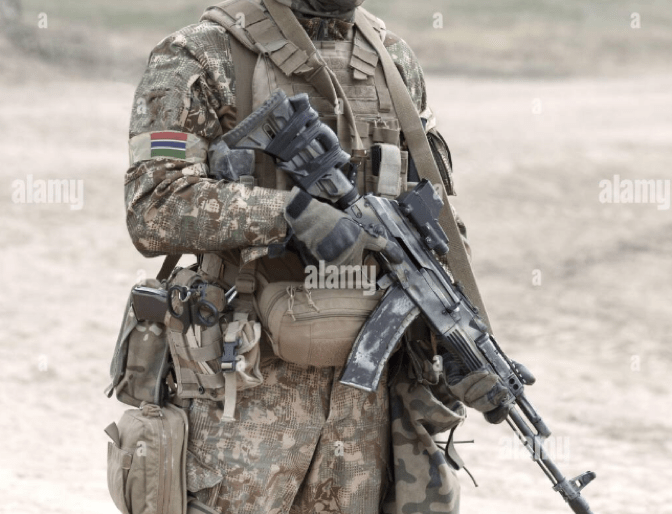
– Advertisement –
By Lt. Col. Samsudeen Sarr Rtd
In the turbulent summer of 1990, as the Liberian civil war raged and Monrovia burned, a quiet Gambian officer stood on the frontlines of one of Africa’s most chaotic peace missions. His name was Lieutenant Colonel Momodou Gaye, the commander of The Gambia’s contingent in the Economic Community of West African States Monitoring Group (ECOMOG), a man of discipline, courage, and remarkable humility.
Yet, history dealt him one of its cruelest injustices. For his loyalty and professionalism, he was betrayed, scapegoated, and dishonourably dismissed, branded a traitor in a mission where the true betrayal came from elsewhere.
– Advertisement –
You see, the Ecomog operation in Liberia was conceived in haste, launched without proper planning, and so poorly coordinated that it was never even given a code name, a rarity in military annals. The Western powers, notably the United States, Britain, and France, had enthusiastically endorsed the idea of intervention to stop the bloodshed. But when Operation Desert Shield erupted in the Persian Gulf, their promised funding evaporated overnight.
Left in the dark, Nigeria stepped up, deploying over 2500 out of the 3,000 troops and shouldering nearly 90 percent of the cost, from armored vehicles to airlifts, while the smaller Ecowas nations, including, The Gambia, could only provide manpower and personal weapons.
Even within Ecowas, the mission was controversial. Francophone states such as Ivory Coast, Senegal, and Burkina Faso dismissed it as meddling in Liberia’s internal affairs. But under pressure from the same Western powers that had abandoned the mission financially, they muted their criticism and contributed nothing.
– Advertisement –
When Ecomog finally landed on Monrovia’s beaches under heavy shelling from Charles Taylor’s NPFL rebels, Liberia was already in tatters. Taylor’s forces controlled nearly the entire country, while President Samuel Doe and the remnants of his government were besieged inside the capital.
It was during this chaos that Prince Yormie Johnson, Taylor’s ambitious field commander, broke away to form the Independent National Patriotic Front of Liberia (INPFL). Unlike his former boss, Johnson welcomed Ecomog’s arrival and pledged to cooperate with the peacekeepers.
Among all the contingent commanders, Lt Colonel Momodou Gaye developed the warmest working relationship with Prince Johnson. He saw in him not a rebel to be feared, but a potential ally for peace. Their rapport was open, transparent, and trusted by everyone in the Ecomog command. Gaye could visit Johnson’s base freely, sometimes staying overnight, and no one found that unusual. It was the practical diplomacy of a soldier seeking to build bridges in a fragmented war.
Ironically, this very trust would later be twisted into a weapon against him.
On September 9, 1990, President Samuel K Doe arrived at the Ecomog base at the Port of Monrovia to pay a courtesy call on Lieutenant General Arnold Quainoo of Ghana, the overall commander of the multinational force. It was meant to be a routine gesture of goodwill.
Instead, it became one of the most infamous days in African military history.
Without warning, Prince Johnson’s forces stormed the base, capturing and brutally killing President Doe and his entourage, while the world watched in horror. The man who had been considered Ecomog’s friend turned out to be its greatest deceiver.
Up to that very day, Johnson’s fighters had been coming and going from the Ecomog compound with ease. Even General Quainoo himself had acknowledged the INPFL as a “friendly” force. But after the gruesome murder of President Doe, the same commanders who had embraced Johnson scrambled to deny responsibility.
In the desperate bid to save face, fingers began to point in all directions. And the smallest contingent, The Gambia’s, became the easiest target. Lt. Colonel Momodou Gaye, once respected by all, was suddenly branded the “mole” who allegedly leaked Doe’s visit to Johnson.
To make the lie believable, his accusers concocted wild stories, that Johnson had paid him in gold dust, that he had betrayed Ecomog’s trust for profit. None of it made sense. Those who served with him knew that Gaye’s integrity was beyond question.
Even if he had mentioned Doe’s visit to Johnson, it would have been in the spirit of open communication between allies, not as a tip to an enemy. But the truth was irrelevant and the political embarrassment demanded a sacrifice.
Tragically, President Sir Dawda Kairaba Jawara, then Ecowas Chairman, was misinformed and led to believe the false reports. Lt Colonel Gaye was dismissed dishonorably from the Gambian National Army, his reputation destroyed, his years of service erased with a stroke of the pen.
Soon after, General Quainoo was replaced by Major General Joshua Dogonyaro of Nigeria, who immediately reclassified Prince Johnson as an enemy combatant and banned him from Ecomog territory. It was too late. The damage, both moral and personal, had already been done.
Lt Colonel Gaye lived the rest of his life under a cloud of undeserved disgrace. Yet, those who knew him, comrades, subordinates, and even former adversaries, remember a man of quiet strength, integrity, and patriotism.
He was a soldier betrayed by circumstance, not by duty.
Today, as The Gambia continues to honor its heroes and rewrite its national story, it is time to right this historical wrong.
I therefore call upon His Excellency President Adama Barrow to posthumously clear Lt Colonel Momodou Gaye’s name, rescind his dishonourable dismissal, and promote him to the rank of full Colonel. Such a gesture would not only restore his dignity but also reaffirm our nation’s commitment to justice, even long after the battlefield has fallen silent.
To the veterans who served with him, I urge you to join in this appeal. Let us honour the memory of a man who stood for duty, loyalty, and peace in a time when both were in short supply.
May the soul of Lt Colonel Momodou Gaye rest in eternal peace!
May history finally speak his truth.








